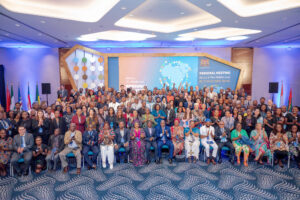Kenya Convenes Reformers from Africa and the Middle East to Advance Open Government
Nairobi, Kenya – The new CEO of the Open Government Partnership, Aidan Eyakuze and the Principal Secretary for Foreign Affairs of Kenya, Korir Sing’Oei opened the 2025 Open Government Partnership (OGP) Africa and the Middle East Regional Meeting, underscoring the urgency of strengthening transparency, accountability, and citizen participation across the region. As governments and civil society navigate challenges such as funding cuts, corruption, and shrinking civic space, this convening offers a platform for bold reform commitments and renewed collaboration.
This year’s Regional Meeting, which brought together more than 350 participants including leaders in government, civil society, academia, donors[1], and more, celebrates the expansion of the open government community, welcoming Benin and Zambia as the newest OGP members, alongside a growing number of local governments committed to transparency and civic engagement [2]. Their participation reflects a growing momentum for open government at both national and subnational levels, reinforcing the importance of inclusive reforms that improve people’s lives.
Today’s inauguration featured insights from leading open government champions, including Ambassador and Special Envoy on Technology for Kenya Philip Thigo; Steph Muchai, incoming Civil Society Co-Chair of OGP; Sakaja Johnson, Governor of Nairobi County; and Zuki Kota from the The Public Service Accountability Monitor of South Africa.
The Opening Plenary was preceded by a Ministerial Roundtable, bringing together ministers and other government and civil society leaders from countries like Kenya, Benin, Cabo Verde, Côte d’Ivoire, Ghana, Morocco, Nigeria, Senegal, Seychelles, and Tunisia. They shared experiences, challenges, and solutions in advancing the open government agenda.
Similarly, mayors, governors, and other heads of local governments organized a Local Leaders Roundtable where they shared how aligned efforts and peer learning are strengthening reform ecosystems and helping to scale and sustain impact.
These high-level discussions highlighted best practices and innovative policies that strengthen transparency, accountability, and public participation.
Several national and local governments have recently stepped up their commitments to open government by submitting ambitious reforms to the Open Government Challenge [3]. These include groundbreaking initiatives on anti-corruption, digital governance, and civic space, demonstrating a regional drive toward greater accountability and responsiveness to citizens’ needs.
For instance, Malawi has begun work to create an online procurement system that uses beneficial ownership data. In Senegal, the government will be conducting public outreach to support the soon to pass Access to Information Bill and creating an independent agency to implement it. In Sierra Leone, reformers plan to amend the Ombudsman Law to address complaints at a faster rate and increase access to justice.
With trust in governance at a crossroads, the meeting provided a crucial opportunity for reformers to exchange best practices, foster partnerships, and push for bold action. Participants explored solutions to challenges such as civic space restrictions, barriers to public participation, and the misuse of digital technologies, while also learning from successful initiatives that have strengthened public service delivery and transparency.
The momentum from this regional gathering will continue at the OGP Global Summit in Vitoria-Gasteiz, Spain, in October 2025. Governments and civil society from Africa and the Middle East are encouraged to use this regional meeting as a stepping stone to refine and advance their commitments before showcasing them on the global stage.
_____
Notes to editors
For press queries or more information, please contact [email protected].
[1] This event was kindly supported by the Agence Française de Développement, Charles S. Mott Foundation, the David and Lucile Packard Foundation, the European Commission, the UK Foreign Commonwealth and Development Office, Ford Foundation, Hewlett Foundation, the International Development Research Centre, Open Society Foundations, and the Swedish International Development Agency.
[2] These local governments include Ouellé, Côte d’Ivoire; Tamale, Ghana; Kakamega, Kenya; Machakos, Kenya; Agadir, Morocco; Souss-Massa + Oriental + Drâa-Tafilalet + Laayoune-Sakia El Hamra, Morocco (consortium); Anambra East, Nigeria; Dakar, Senegal; Yoff, Senegal; Dar Chaabane El Fehri, Tunisia; and Zriba, Tunisia.
[3] The Open Gov Challenge is a call to action for all members of OGP to raise ambition in ten areas of open government to help strengthen our democracies. National and local governments are welcome to submit initiatives to the Open Gov Challenge before May 31st to be considered for the Open Gov Awards, to be presented in October 2025.
ABOUT OGP:
The Open Government Partnership (OGP) is a unique global initiative that brings together governments and civil society to drive concrete commitments aimed at promoting transparency, increasing public participation, combating corruption, and leveraging technology to make governments more open, effective, and accountable to citizens worldwide.
Launched on September 20, 2011, during the UN General Assembly, OGP began with eight heads of state and an equal number of civil society leaders endorsing the Open Government Declaration and unveiling the first set of action plans, each containing specific commitments to advance open government reforms. Since then, OGP has expanded to 77 countries, 150 local governments, and thousands of civil society organizations. OGP’s Independent Reporting Mechanism ensures accountability by providing comprehensive, impartial reports that assess government progress on these commitments.


Leave a Reply